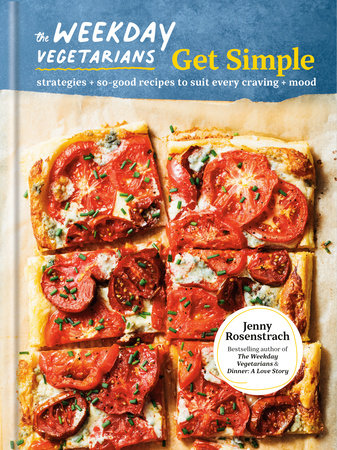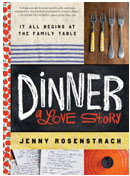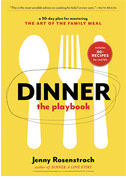Last weekend I was in my friend Nina’s bright, airy kitchen, taking in the expansive view of the Hudson River out the back window, when she motioned me over to the kitchen table. “Please sit down,” she said. In front of me, there was a small pile of cookbooks, some old Gourmet magazines, and a well-loved, yellowed recipe booklet that once belonged to her grandmother. Nina handed me a pad of paper and a pencil. She took a seat next to me and said, “I feel like maybe I should be lying on a couch.”
Her 9-year-old came bounding into the kitchen and thanked me — unprompted! — for the meal Andy cooked for him at our house the night before. We laughed. We talked about last night. He left and she turned to me again, a serious look on her face.
“OK, Nina,” I said. ” What seems to be the problem?”
She took a deep breath. “I just can’t get organized when it comes to grocery shopping” she said. “I really need help.”
Because of my line of “work,” I seem to land myself in these kinds of dinner heart-to-hearts all the time. I imagine my friend Kate, a psychologist and the world’s best listener, helping her friends through stress and anxiety and deeply personal issues, offering them comforting advice with phrases like “That’s normalizing.” Not me. My patients’ issues — at least as they present themselves to me — tend to center more on pork chops and grocery lists. Last year, at pick-up, a mother of three approached me and said “I get angry – really angry, when my kids say they don’t like the food I’ve spent time cooking for them.” She paused then added, “Sometimes I have to get up and walk away from the table.” About a gazillion times a month I hear this complaint: “We eat the same things week after week. I can’t seem to break out of the rut!” Last year, after a book talk I gave at a local school, a mother asked me: “What do you do if you don’t know how to make sauce?”
But of all the issues that can face a dinner-maker — no time, no skills, no inspiration, no help with the cooking — Nina has the big one down: Family dinner is the house default mode. She and her husband (who both work from home) and their two kids sit down to a meal together every night.
“What are you so worried about?!” I told her. “That’s the hardest part to nail!”
She didn’t quite see it that way. “I guess. But I never have a plan when I go shopping,” she told me. “I never seem to have what I need to improvise.” She led me to her pantry and, Vanna-White-style, swept her arm across the shelves. There were three full bags of panko breadcrumbs, about a dozen bags of pecans. Nina told me she hits the supermarket once a week for the kids’ school lunch and breakfast staples, but on that shop doesn’t ever think about dinner ingredients. “Honestly,” she told me, “I don’t really think about dinner until the moment I’m standing in front of my refrigerator at 6:00.”
I had a sudden urge to rewrite the first line of Anna Karenina: Every unhappy family dinner-maker is unhappy in his or her own way. But instead I started scribbling some strategies that I wanted her to put into play immediately.
Strategy 1: Think about dinner before you have to make it. It’s not exactly breaking news, but if the goal is to make dinner something to look forward to — as opposed to one more task in between “pay taxes” and “schedule root canal” on the to-do list — you need to plan ahead. And planning ahead comes in all shapes and sizes. It means on Sunday, you look at the schedule for the upcoming week to determine which nights are going to be home-cooked meal nights and which ones are going to be storebought dinner nights. (And which ones are going to be Moo Shu pork in front of American Idol.) It means on a Monday or Tuesday morning taking two minutes to ask yourself: What can my 8:00am self do to help my 6:00pm self? Marinate something. Chop something. At the very least, decide on something. Get the momentum going.
Strategy 2: Try something new once a week. Nina’s kids eat almost any meat and love salmon, but they don’t love things mixed together, and could use some help expanding their vegetable repertoires. We looked in my upcoming book for some salmon recipes that were familiar to the boys, but different enough to feel like she was busting a rut. We also looked for interesting ways to upgrade the vegetables so the grown-ups could get a little more joy out of the steamed broccoli. I always feel like the trick to trying something new is to introduce it gradually — and preferably when there’s something else on the plate that is universally loved and embraced.
Strategy 3: Give yourself at least one From-the-Freezer night. Whether it’s thawing something homemade or chucking in the storebought default dinner you picked up at Trader Joe’s. Nina’s go-to in this situation is Trader Joe’s Mandarin Chicken. (Note to self: That stuff looks goood.) Don’t put pressure on yourself to cook something from scratch every night of the week. I don’t have to remind Nina, a sustainability consultant, that the name of the game is to create a sustainable dinner system.
Strategy 4: Be your own sous chef. Make something on the weekend (or at least a Sunday dinner) that can carry over to one meal during the week. It doesn’t even have to be a bolognese — though that would be nice. Even a five-minute homemade salad dressing will end up yielding some seriously happy dividends.
Strategy 5: Go out on Thursday or Friday night. No matter what your dinner issues are, you’ve earned it.
Above photos shot by Jennifer Livingston.








I would love to hear your response to the woman who gets angry when her kids don’t like what she cooked. I tend to have the same reaction when my husband does that to me, especially since I usually run the weekly menu by him before going to the store.
love this post…I start school Monday (eek!) so I am bookmarking this one as inspiration to get a little more organized about family dinners once I add schoolwork to my already full plate!! thanks for the ideas and clear explanations. your posts always inspire!
Another strategy I always use is to write down my week schedule, kids schedule and dinner. Just getting it on paper (even if it changes) helps organize my thoughts. I wrote a quick blog on it: http://www.organizemyhive.com/2012/01/02/back-on-track
On the kids not liking what was cooked – I love my mother’s rule, which was this: If you do not like what has been prepared, you may NOT EVER comment on that fact, but you may quietly get up, make yourself a peanut butter sandwich, and come back and eat with the rest of us. Penalty free.
Knowing we had an out took away the impetus to complain, and also made us more willing to at least try something.
(I wish the security question were above the Submit button – I forget *every* time to scroll down a bit more!)
oh all this is wonderful advice – it always helps to set realistic goals and reward systems (tonight will be our pizza night :-))!
I try hard to follow this rule:
If I’m going to be home, know what’s for dinner by 10 am. If I’m going to be out of the house for most of the day, know what’s for dinner by 10 pm the night before.
You guys are on fire this week! Amanda from Dinners in the FourOneFive also just posted about this, for those looking for more advice. http://dinnersinthefouronefive.blogspot.com/2012/03/anatomy-of-menu.html
My favorite Sunday ritual is sitting down with magazines and notebooks and making a list, then spending all day “sous cheffing” and grocery shopping. Right now I can do it leisurely because we don’t have kids, but that day is rapidly approaching, so I am anxious to learn tricks to not let it slide from my routine.
Wow… I am totally impressed by the detail that you put into this… She is lucky to have a friend like you :).
(great tips, and i’m looking forward to prepping my salad dressing & bolognese!)
Great post! More of these would be great!
This post is like GOLD! Thank you!
oh my – how amazing. i love the dinner out of the freezer option. once a week would not be so bad; i should give myself that much of a break.
I love this post.
Do you have a more in depth list of things that are your pantry staples? Your blog has jump started my cooking, but i still struggle keeping things on hand
Thanks!
Good tips–I plan for two week stints and my friends and fam have often asked for my assitance in more effective meal planning (and grocery shopping). We don’t do the “new” thing once a week but we do do Dude Food (house full of testosterone)–our chance to eat non-traditionally prepped veggies or a meal made of meat… and the boys get to choose (which always makes the meal cooler).
Thanks for being my go-to as well!
Funny because when you do this you don’t know what you would do without planning the week. I can’t imagine waiting until 6pm to figure out what’s for dinner. I do what Vicki does and write down what the activities are and what nights we have time for a “real” dinner then plan around that. Loved your post on from the freezer meals. We’re big on frozen ravioli & gnocchi and homemade meatballs & chicken cutlets from the freezer. Those are my go to meals when I haven’t organized the week and am scrambling at 6pm.
Do you have any recommendations for homemade meals from the freezer? These would also be great to bring to a friend who could use help (new baby or death in the family) but who is past lasagna and pasta dishes. I’ve needed to come up with some of these lately and I’m having trouble!
Sara – that is a post I’ve been meaning to write forever. I’ll try to get something together next week on it. Thanks for the suggestion.
Jenny, thank you!! This post is awesome. Could you please, pretty please, do one sometime that’s geared toward more vegetarian options? Totally can’t wait for the DALS book, too.
Emily – Yup. Maybe the next one will by my own, in which case there is always a Meatless Monday….or two.
Great tips! Thank you!
Surely I’m preaching to the converted but I’ve found it helpful to make twice the quantity of whatever I’m freezing and use the second portion two weeks later.
Also good with side dishes – the formula goes something like this:
steam twice as much broccoli, purée and freeze what’s left, thaw some other day, reheat adding stock (water+cube) if necessary, thicken with some leftover or instant mash, add croûtons or frankfurters sliced into coins and there’s your soup (grown-ups get hot chilli flakes and lemon juice, too).
Twice as many plain steamed potatoes become next evening’s hash, twice as much plain white rice turns into fried rice or pilau, boiling a few more eggs means instant protein with salad the next evening (egg-and-cress sandwiches anyone? Lamb’s lettuce mimosa?), twice as much couscous and you’re halfway towards tabbouleh – the lamb rack to go with it takes 20 minutes in a hot oven …
Än Guete (Swiss for bon appétit)
a
I too use a strategy like Vicki’s, however, I also include a “dinner notes” column between activities and meal plan. I jot things like “crock pot”, “start Tuesday”, “3 shifts of eating”, etc. That way I can also account for timing – mine between work an activities, and who is eating when. Although there are nights I write “give up”, it really does help me get meals done most nights of the week! And we capitalize on nights we are all home for a sit-down meal!
One of my best strategies for preparing for the weekly meals has been to think in categories. Our dinners are pretty tradition in that they mostly-always have a protein, a starch and a vegetable (or a few vegetables.) So I stand in the produce aisle and pick enough vegetables for the number of meals we’ll cook that week. I buy enough salad to have with each of those meals. Then I think of having enough potato, corn, beans, rice, pasta, etc. Last, I go to the meat section and buy that many types of meat (a fish, a chicken, a steak, a chop, ground something…)
During the week, I cook in reverse based on how long the meats will stay fresh uncooked (cook fish first!) At the end of the week, we order in.
Another great strategy is to shop through Peapod delivery service. On the weekend, I can sit in my kitchen, looking at what food I have and think what to get for the week. I don’t have to remember whether I have any Panko breadcrumbs, so I never end up with 3 bags of Panko and no chicken broth. And when I look at the summary, it’s easy to see if I ordered a balance of all types of foods (and no impulse buying chips or candy!)
Inspiration for the week ahead! Dad snd daughter shop at Stew Leonards each Sat so i need to have list ready. These strategies should help a million!
Loved the post! I too plan on Sunday night with the list of activities and ideas such as a fish night, a meatless night and a frozen night for those kids classes that go way late. Makes the week so much better and when I don’t boy do I regret it. Thanks!
Hi!
Love this post and your book!
My little one has a soy allergy–any suggestions for the pork instead of soy?
Jean – I’m guessing you could replace the soy with Tamari or gluten-free soy sauce?
I love this! I use a similar weekly planning strategy, but am always hoping to improve it. Your tips and many in the comments will be great to work into my current system.
I’m a big fan of making extra and freezing it; it comes in handy on the unplanned nights. Another thing is with leftovers- my goal is always to “re-do” our leftovers so that it’s not the same dish. For example, pan-seared fish and veggies one night becomes fish tacos another night. Soup one night becomes soup over rice with poached eggs another. The little changes really make it more interesting.
Thank you!
Jenny, thanks for a fabulous post. Even though I love to cook and eat, I find 2 kids, 2 jobs, 4 busy lives means reaching for a frozen pizza far too often. I am excited to follow your plan and to keep reading!
One of my most favorite posts that you’ve ever written! Love it!
Fantastic post! And I’m lovin all the commenters’ suggestions too. I’ve been supporting families to transform their picky eaters into food-confident kids for years now and I fully agree – having a plan is so important. As the saying goes…if you fail to plan, you plan to fail. While it feels like meal planning takes more time & energy – it actually saves way more time than it takes – and it also saves so much anxiety – you know, that dreaded feeling that builds all day when you don’t know what you’re going to make for dinner.
I have some advice for the woman who shared how angry she gets when kids don’t like what she makes. It’s very natural to put a lot of love into what you cook for family and when they don’t like the food, it feels like they are rejecting you. Picky eating is very normal for kids – it isn’t them rejecting you. For many picky eaters it has nothing to do with you – they’re just honestly scared of trying the new food (or they honestly don’t like it). Before you cook your next meal, take a quiet moment and brainstorm all the many non-food ways that you can express your love for your family. Write them down and keep them nearby (or make it a memo on your smart phone/iPad). Pour your heart and soul into these ways. And, cognitively remind yourself while you prepare each dinner that your job is to plan, prepare and provide food. As long as you’ve done that, you’re a fantastic parent! Them liking what you’ve made – that’s outside of your control.
This is a brilliant post! Definitely will be using some of these recipes! I recently started meal planning and grocery list making and it’s a great way to watch your money as well as your health!!
I wouldn’t mind if you did this more often:)
I loved reading this post. I plan my meals weekly and close friends are always asking for advice on how I do it. It does take effort – I typically sit down late Saturday night and go through my recipe books/blogs and generate my list. It feels so great coming home from the stores Sunday morning knowing I have ingredients for roughly 7 meals. I like my kitchen well stocked!
I’m making the salmon tonight and I am so excited to try it!
Hi Jenny,
I discovered your blog a few weeks ago, and absolutely love it! I am still reading my way thru the posts and comments, your writing style is so engaging and full of humour, I feel like you’re talking about my life! Like you, I have been a diary keeper/list writer/meal planner for years, originally “hiding my condition” for fear of sounding too weird; but boy did that compulsive organization come in handy when my kids were born. That was 15 years ago, and I swear for me it’s been the best way to cope with the stress of juggling full time work/kids/home! I know it soulds odd, but I think of the time spent menu planning and grocery shopping as essential to keep our family life happy: watching the budget, making sure everybody is well fed, and with the food issues sorted for the week, I can focus on other stuff !!!